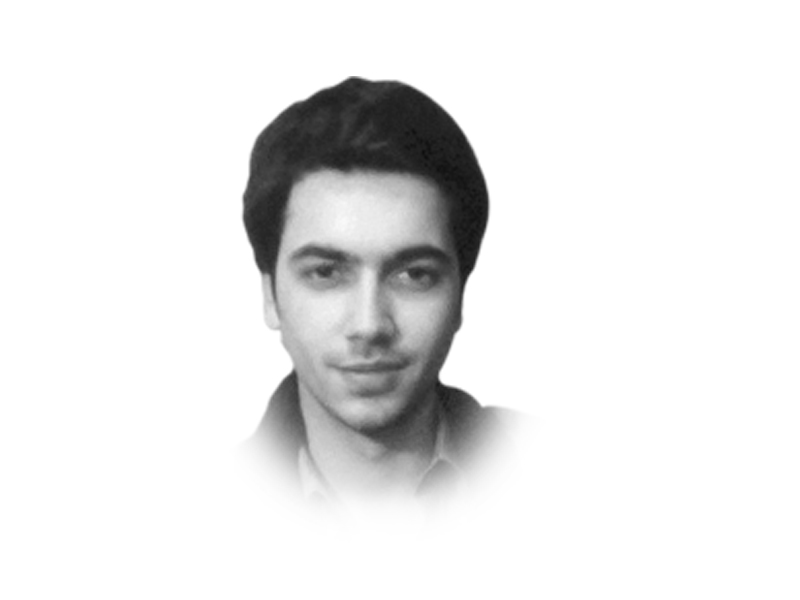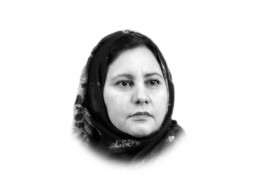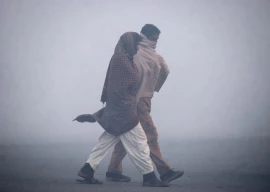
Yes, the ’90s went out in style, in all the heat, dust and death worthy of a decade of palace coups. And not another 10 years later, having outlasted both Switzerland and Saifur Rehman, the gentleman from Bambino was taking oath of office. By May 2013, his government became the first to limp to the finish line and totter over, spent. Resilience lies at the heart of the Zardari story, perhaps as much as its sheer greed. Once in office, party and president floated over a Pakistan in freefall.
What happened in Quetta, in Fata, in Karachi, in southern Punjab, has been in plain view. But to his credit, it took an Asif Zardari to jolt us awake. During one moment of reflection last year, the president said, “Iss dharti ke dard hain. Agar yeh dard nahin nikalein ge, aap foundation nahin lay ker saktay.” At least in bringing to the fore all of our ‘dharti ke dard’, the PPP was successful. Bad economics and worse security helped us discover early on that Pakistan was in the abyss. It also helped us discover the people of Pakistan had in them the will to fix it.
Smiling wider than when he came in, the president departs next month, leaving behind a smouldering state. But though our ‘dharti ke dard’ clearly sent the PPP reeling, it wasn’t before the Party laid one foundation their co-chairman had dreamed of: a clean, clear, democratic transition. And in the very long run, that may mark the beginnings of a better place to be in.
As fresh blood streams in, and the Class of ’85 thins out, parliament can be hoped to become more and more representative of the people who vote them in. Election after time tabled election is improving the quality of debate. Performance is edging out baradari, party slants are gaining on personality strength. To take the wider view, a respect for the democratic process is taking hold of the Pakistani consciousness.
People still yearn for the quick fix and, with issues as dire as ours, it’s hard to blame them. But quick fixes, for this hard country, have all but failed. Army takeovers are red-button tactics at best and resemble Cairo at worst. As Brian Cloughley said of Pakistan, “Military people are usually quite good at running large organisations, even civilian secretariat, but generally, fail to understand politics and the government, and the give-and-take so necessary in the esoteric world.” The way forward is civilian and organic. People realise as much.
That said, what isn’t meriting enough realisation is just how much the men in uniform, out of the immediate picture, are sacrificing to this war. Over 5,000 of our soldiers have laid down their lives, unsung and uncelebrated. They fought and continue to fight through peaks and valleys, through Swat and Bajaur and Tirah, so the rest of us can play at security analysis.
That this is a battle for the heart and soul of this country is in little doubt today. It would be worthier perhaps, to act grateful to those who fell fighting for it. Grateful to Major General Bilal Omer, who fought off mosque-storming killers with his bare hands. Grateful to the bomb disposal squad’s Hukam Khan who, having lost three fingers defusing hundreds of bombs in Peshawar, would ultimately lose his life. To say Pakistan isn’t fighting this war is to not understand the quality of life it has lost. To think it will cave in is to not understand the calibre of people still fighting to keep it the Pakistan they grew up in.
Towards the civilian side, there are glimmers of hope. The Nawaz League seems to have learnt from its ’90s knife fights, at home and abroad. The energy crisis is being grappled with. Recent tensions saw Indian anchors bay for blood across the LoC; Pakistan kept its cool. A counter-terror policy, at least, we are told, is in the works. Meanwhile, in Khyber-Pakhtunkhwa, the PTI is shaking off its May daze and planning out long-term development. Down south, Balochistan’s Dr Baloch voices the need to heal a province Aslam Raisani couldn’t even pretend doing.
In short, there are things going right and more hopefully, there are growing numbers of Pakistanis wanting to make them right. A column by Adil Najam pointed out some of the brighter points: the extent of Pakistani philanthropy, their innovativeness, their desire to educate themselves and their children. Most compellingly, Mr Najam spoke of being part of a generation “whose greatest sin was remaining silent in times of tribulation”. The new generation is free from any such apathy. It is loud, self-aware and seeking answers. Helping the conversation along is among the world’s youngest and most vibrant media cultures.
Recently, we saw a random gentleman shut down Islamabad, two semi-automatics in hand, three hostages in tow. Negotiations went on for hours in what was an utter security failure. Then, ambling down the lane like on any casual Thursday, was Zamarrud Khan, hand over heart, intent in his eyes. A man hitherto best known for his wonderful work with Pakistan’s Sweet Homes orphanages, Mr Khan speared Sikander — and was sidestepped. Mr Khan fell. Sikander fired. The police fired. Sikander fell. The saga ended. Mr Khan had no plan, no fallback, and to some, no sense. He went in with little more but the strength of his heart.
And it worked. Call it crazy, but one gets the feeling that Pakistanis have much to hope for yet.
Published in The Express Tribune, August 27th, 2013.
Like Opinion & Editorial on Facebook, follow @ETOpEd on Twitter to receive all updates on all our daily pieces.
COMMENTS (15)
Comments are moderated and generally will be posted if they are on-topic and not abusive.
For more information, please see our Comments FAQ

1726117332-0/Megan-Thee-Stallion-(1)1726117332-0-165x106.webp)

















Really well written Asad. Great insights.
welcome back, sir
ET won't publish my comment but here goes again Zamarrud for PM Asad Rahim for Tourism Ministe
Stay hopeful, I shall not
Excellent
@aqib If you are talking about Corruption Yes Our political Class holds first position. Sad but true,Total amount of Corruption (2009-13) was much more than entire budget of Pakistan. (may be our leaders are better then yours in this art)
@Wasi So you are feeling good? But instead of Sweet candy i would prefer to take bitter medicine,
Excellent article! There is still hope for Pakistan no doubt. Its hope is its millions of hardworking, vibrant and resilient people who despite all odds and security fears step out of their homes in pursuit of education and livelihood. And no one should say that they have become numb and indifferent. If it were true, they would not have flocked out of their homes to vote in such large numbers despite threats from terrorists.
Well said.
I found this made me feel better about Pakistan after a long time. Its truly a topsy turvy country, byt I thank the writer for making me feel proud of our people and our soldiers. Once again, writing that is controlled and from the heart.
You try so hard to write political commentary in a stream of consciousness mode. Which only you can understand. No impact, no meanings.
The author talks about our soldiers dying unsung and he is not alone, many do decry this fact, but one should look at the real causes as well. There is one thing that has to be realised; we cannot Win this war without unlearning false history, where invaders are heroes and locals villains. I am a pothwari/pahari and we have a lot of people joining the army and fighting the Taliban. And here is the thing, people in our areas still refuse to accept that those whom we are fighting are in fact Taliban. The whole "foreign agents" theory pervades the public opinion, or the "they can't be Muslims" narrative. This war will not be won until the states radically transforms its conventional narrative into something that corresponds with our real history.
If uninterrupted democracy is the answer, why the leaders of India today are more corrupt then the lot in 1950's. And if this is a requirement for progress, why China has taken huge strides (with hardly any democracy), far ahead of others?